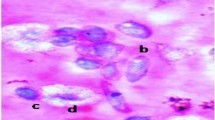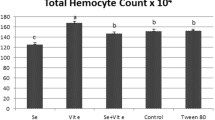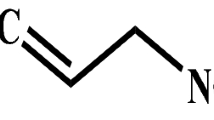Abstract
DAY1 found that in the larva of Tineola, the columnar but not the goblet cells contain vitamin C. Dadd2 reported that vitamin C is essential in the development of Schistocera gregaria. Gilmour3 found ascorbic acid widely distributed among insects and synthesized by them. An investigation of different larval instars of Plusia signata was undertaken to determine the distribution of ascorbic acid in different tissues in these stages.
This is a preview of subscription content, access via your institution
Access options
Subscribe to this journal
Receive 51 print issues and online access
$199.00 per year
only $3.90 per issue
Buy this article
- Purchase on Springer Link
- Instant access to full article PDF
Prices may be subject to local taxes which are calculated during checkout
Similar content being viewed by others
References
Day, M. F., Austral. J. Sci. Res., B, 2, 19 (1949).
Dadd, R. H., Proc. Roy. Soc., B, 153, 128 (1960).
Gilmour, D., Biochemistry of Insects (Academic Press Inc., New York, 1961).
Bacchus, H., Amer. J. Physiol., 163, 326 (1950).
Robinson, W. B., and Stotz, E., J. Biol. Chem., 160, 217 (1945).
Author information
Authors and Affiliations
Rights and permissions
About this article
Cite this article
SAXENA, P. Ascorbic Acid in the Larval Stages of Plusia signata (Lepidoptera : Noctuidae). Nature 209, 535–536 (1966). https://doi.org/10.1038/209535b0
Issue Date:
DOI: https://doi.org/10.1038/209535b0
This article is cited by
Comments
By submitting a comment you agree to abide by our Terms and Community Guidelines. If you find something abusive or that does not comply with our terms or guidelines please flag it as inappropriate.



